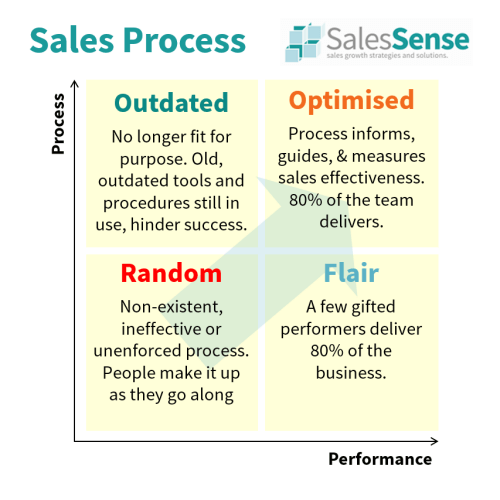Compare best practices in these sales process articles.

This page presents sales process articles, reports, and papers that address the challenges of generating a predictable flow of profitable business.
It is quite easy to identify the best practices for working a sales territory, serving key accounts, winning high-value opportunities, and conducting sales campaigns. Yet achieving consistent application in the field is a rarity. Improvements in the sales process and governance can considerably increase adherence to best practices. Our collection of sales process articles discusses best practices and their implementation.
Browse the titles listed below or use the search box at the top of the right-hand column to find what you are looking for.
- Account Management for Customer Retention
- Business Turnaround Strategy
- Cold Calling Excuses Measured
- Eleven Practical Ways to Sell More
- How to Close a Sale and Avoid the Black Hole
- How to Get an Edge and Win More High-Value Complex Sales
- How to Seize Control and Solve Modern Sales Problems
- How to Win with Sales Strategy
- How to Win with a Sales Plan
- The Cheese has Moved
- The Truth About Plans and the Remarkable Value of Planning
- Two Types of Sales Wheel
- Use the Power in a Sales Process to Win More Business
- What to do About the Latest Sales Trends and Predictions
More Ways that Sales Process Makes a Difference
Consistency and repeatability: Sales processes establish a standardized approach to sales activities. This consistency ensures that salespeople follow a proven methodology, reducing variations in performance and outcomes.
Improved efficiency and productivity: A well-defined sales process streamlines sales activities, eliminating redundancies and inefficiencies. It provides salespeople with a clear roadmap, guiding them through each stage of the sales cycle. This improves their productivity by enabling them to focus on high-value activities, prioritize their efforts, and make better use of their time.
Better qualification and targeting: Sales processes emphasize effective qualification and targeting of prospects. By systematically evaluating prospects against predefined criteria, salespeople can identify and prioritise those with the highest potential for conversion.
Enhanced customer understanding and engagement: Sales processes encourage a thorough understanding of customer needs and preferences. They emphasize active listening, effective questioning techniques, and customer-centric selling. By engaging customers in meaningful conversations, salespeople can uncover pain points, tailor their offerings to meet specific needs, and build stronger relationships.
Effective objection handling and negotiation: Sales processes equip salespeople with strategies and techniques for handling objections and negotiating effectively. By understanding common objections, preparing relevant responses, and employing persuasive communication skills, salespeople can address customer concerns and overcome resistance.
Sales pipeline visibility and management: Sales processes provide visibility into the sales pipeline, enabling sales leaders to monitor progress and identify potential bottlenecks or areas for improvement. With a clear understanding of each deal's status and the overall pipeline health, sales leaders can make data-driven decisions, allocate resources effectively, and provide targeted coaching and support to salespeople.
Visit our blogs for more:
Issues and news for those who sell technology, software, or know-how-based business solutions:
Our founder's blog free wheels to encompass a wider set of ideas and issues:
Follow this link for other article topics or search this site for answers. Don't miss our regular content updates, sales articles, new ideas, and solutions. Subscribe for sales news.
We often publish sales process articles from guest authors. To suggest articles for inclusion, We will be pleased to review any articles put forward. Alternatively, email custserv@salessense.co.uk, use the contact form here, or call +44 (0)1392 851500.












